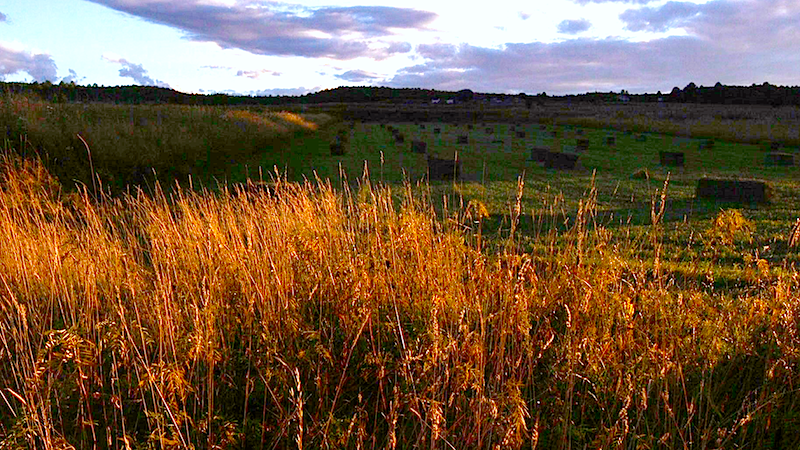
WASHINGTON – June 28th, 2018, U.S. Senators Tom Udall (D-N.M.) and Martin Heinrich (D-N.M.) announced that they have secured a provision in the Senate’s 2018 Farm Bill to make acequias eligible for grants and technical assistance from conservation and environmental programs through the U.S. Department of Agriculture’s Natural Resource Conservation Service (NRCS) to increase agricultural water efficiency and further conservation of soil, water, and other natural resources.
Acequias provide water for many small and traditional farmers in New Mexico. There are hundreds of acequia associations throughout the state that will be eligible under Senators Udall and Heinrich’s provision. Udall and Heinrich have long worked to help New Mexico’s traditional communities access federal programs and funding for water and resource conservation projects. In 2017, the senators introduced the Providing Land Grants and Acequias Conservation and Environmental Services (PLACES) Act of 2017, legislation that forms the basis of Udall and Heinrich’s farm bill provision. The 2018 Farm Bill improves upon the PLACES Act by granting acequias direct access to NRCS programs by expressly including them as eligible entities for NRCS programs. This cuts red tape and allows for parity with other producers.
“Acequias and the majordomos and parciantes that operate them represent an integral part of New Mexico’s centuries’ old heritage that continues to this day, providing good stewardship for our land and helping maintain our state’s water infrastructure since before statehood,” Udall said. “Acequias hold great historical and cultural significance in New Mexico, and acequia users produce healthy food for our families and communities, protect our water quality, and conserve our lands. Our water, agricultural lands, and rural areas will benefit now that acequia associations can apply directly for NRCS grants and technical assistance. For too long, the federal government did not recognize acequias as eligible entities and producers could not easily access these federal programs. Our new provision in the Farm Bill remedies that.”
“Acequias are the lifeblood of northern New Mexico’s rural communities. New Mexico’s acequia associations and land grants should be able to access important federal water and land conservation programs and resources just like any other irrigation districts,” Heinrich said. “By securing this provision in the Farm Bill, we can improve the process to allow New Mexico communities to access the resources they need to make long-term plans on a landscape scale and conserve our vital natural resources for future generations.”

The bill makes acequias eligible for grants and technical assistance from the NCRS Environmental Quality Incentives Program (EQIP), Conservation Stewardship Program, and Agricultural Conservation Easement Program.
The Environmental Quality Incentives Program helps agricultural producers adopt practices that ensure sustainable production on farms, ranches, and working forest lands that protect soil, water, plan, wildlife, and other natural resources. Funds from EQIP can be used to improve irrigation delivery systems – like water control structures, pipelines, and concrete ditches – that benefit individual or multiple land owners.
The Conservation Stewardship Program (CSP) helps producers build on their initial conservation efforts while strengthening their operations through increasing crop yields, improving grazing conditions, developing wildlife habitat, and other measures. New Mexico has the second highest number of acres enrolled in CSP.
The Agricultural Conservation Easement Program helps conserve agricultural lands through easements that limit non-agricultural uses and helps protect wetlands through easements that restore and enhance wetlands.
Acequia associations are political subdivisions of the State of New Mexico, but unlike other subdivisions, they can’t levy taxes on users. Therefore, the cost of upkeep and repairs is borne by individual members of the community. Direct access to NRCS grants and technical assistance will give acequias access to needed resources to improve their farm and ranch operations, carry on their cultural traditions, institute sustainable practices, and protect our natural resources.
Ralph Vigil, Chair of the New Mexico Acequia Commission stated, “Our Acequias have been the life and blood of New Mexico’s communities for over 500 years and have persevered in times of drought and water shortages over the centuries. As we continue to experience changes in our climate and ecosystem, this legislation will provide the necessary tools in building long term sustainability for our Acequia communities for the next 500 years.”
“We greatly appreciate the efforts of Senators Udall and Heinrich to improve the eligibility of acequias for conservation programs in the Farm Bill,” said Paula Garcia, Executive Director of the New Mexico Acequia Association. “Acequias are centuries-old irrigation systems that support the livelihood of farmers and ranchers who contribute to New Mexico’s agricultural economy and cultural heritage. Investment in conservation practices and improvements in acequias will help to expand the availability of locally grown food and support the livelihood of farmers and ranchers.”
### Contacts: Ned Adriance (Udall) 202.228.6870 / Whitney Potter (Heinrich) 202.228.1578


Leave a Reply